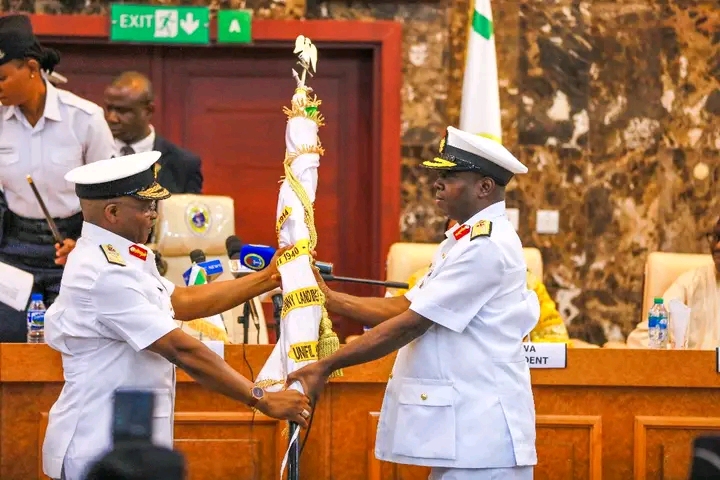By Abdul Lauya
Two years ago, Vice Admiral Emmanuel Ikechukwu Ogalla assumed command as Chief of the Naval Staff (CNS), ushering in what has become a defining era for the Nigerian Navy (NN). Appointed on June 19, 2023, by President Bola Ahmed Tinubu, GCFR, Ogalla inherited a Navy at a crossroads, grappling with mounting maritime security threats and an urgent need for institutional renewal.
Under his watch, the Nigerian Navy has grown into a more capable and respected force, now ranking as the third-largest navy in Africa, surpassed only by Egypt and Algeria. One of the most telling indicators of progress has been the Navy’s maritime security success. With a credible and sustained presence at sea, Nigeria has recorded zero piracy incidents in its territorial waters since March 2022, a milestone that continues to boost its global maritime standing. This achievement played a key role in Nigeria’s removal from the International Maritime Bureau’s list of piracy-prone countries, reinforcing the Navy’s operational credibility.
In January 2024, Ogalla launched Operation DELTA SANITY, a full-spectrum campaign against crude oil theft, a persistent threat to Nigeria’s economic lifeline. By the end of that year, the operation was expanded to incorporate aerial surveillance and advanced intelligence gathering. The impact was immediate and far-reaching: 808 illegal refining sites were dismantled, 2,411 dugout pits and 5,421 storage facilities neutralized, and 76 vessels impounded. These efforts, alongside the arrest of 242 suspects and seizure of significant contraband including arms and speedboats, led to a dramatic decline in oil theft and vandalism. By the third quarter of 2024, key national pipelines such as Trans-Niger and Trans-Forcados were reporting operational uptime levels between 98% and 100%, significantly enhancing crude oil output.
Ogalla’s leadership has also driven an unprecedented wave of infrastructure development within the Navy. From the construction of a jetty in Bonny and new administrative blocks in Maiduguri to the commissioning of the Naval Training Command Headquarters in Port Harcourt, the Nigerian Navy is undergoing structural transformation. Lagos, Abuja, Borno, Yenagoa, and Enugu have all seen major facility upgrades, including accommodations, worship centres, arrival halls, medical centres, and parade grounds. The developments in Navy Town, Ojo, ranging from new housing units to hospital upgrades, illustrate a broader focus on welfare and living standards for personnel.
The acquisition of NNS SHERE, FARO, and IKOGOSI, as well as three Agusta Westland helicopters, has enhanced the Navy’s operational flexibility. The seaward defence fleet is expanding with two new boats currently under construction at the Naval Dockyard in Lagos. NNS KADA, the Navy’s strategic sealift capability, is already playing a critical role in regional security operations, particularly in support of the African Union.
Strategic institutional expansion has also taken shape. New commands and capabilities have been activated, including the Nigerian Navy Ship MADUEKE, the NN Special Operations Command, and the NN Marines, each representing a shift toward a more specialized, responsive, and multi-domain force. The establishment of the International Maritime Institute of Nigeria (IMION) further underscores Ogalla’s long-term vision for maritime education, diplomacy, and regional integration.
Ogalla’s style of leadership combines operational toughness with strategic foresight. He has consistently advocated for Nigeria’s maritime interest by leveraging military, diplomatic, and economic tools in unison. This multidimensional approach not only enhances deterrence but reflects an evolving doctrine that aligns with national security imperatives and international expectations.
While some observers caution that resource constraints and inter-agency coordination challenges remain, the consensus is that Ogalla’s two-year tenure has been transformative, characterized by discipline, innovation, and results.
As the Nigerian Navy marks this significant milestone, the impact of Vice Admiral Emmanuel Ogalla’s leadership stands as both a benchmark and a blueprint: for professionalism, preparedness, and the credible defense of Nigeria’s maritime domain.
For advert placement and inquiries, publication of press releases, and news coverages, please call: Phone: 08052898434 Email: editor@eyereporters.com, click here to view the advert rates.



